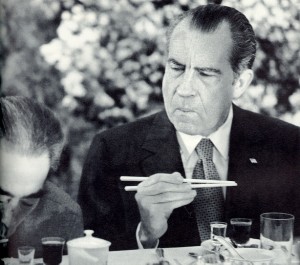Nixon’s Chinese Legacy Posted by Stephen on Mar 30, 2012 in Uncategorized
 In 1972, President Nixon (尼克松 pronounced: Ní kè sōng) did something Western powers had been unable to do since the Opium Wars: open China to the rest of the world. Sure it took years of negotiations, the (timely) death of Chairman Máo Zé Dōng (毛泽东), and the ascension of Deng Xiao Ping as a policy leader before the lingering effects of Nixon’s visit were realized, but for all of his ills, character flaws and shady back door dealings, he got the ball rolling and ushered China into the global modern world.
In 1972, President Nixon (尼克松 pronounced: Ní kè sōng) did something Western powers had been unable to do since the Opium Wars: open China to the rest of the world. Sure it took years of negotiations, the (timely) death of Chairman Máo Zé Dōng (毛泽东), and the ascension of Deng Xiao Ping as a policy leader before the lingering effects of Nixon’s visit were realized, but for all of his ills, character flaws and shady back door dealings, he got the ball rolling and ushered China into the global modern world.
Richard Nixon’s accomplishment still stands as one of the greatest diplomatic achievements of the 20th century. Now, in the 21st Century and with roles reversed, President Hu Jintao (and his successor) and the Chinese are reviving US-Sino diplomatic relations. Lets take a look at how modern Chinese-US relations began.
Thawing of US-Sino Relations:
In 1972, the world was a much different place as the ideological battle between capitalism and communism had crept into Asia. The Vietnam conflict was still fresh in everyone’s mind, while deteriorating relations between Beijing and the Kremlin were at an all-time high. Mao Ze Dong was suffering from an undisclosed illness, forcing many to question the direction China was headed in the coming years. The options were as follows: remain economically, culturally and politically isolated from the rest of the world (following pseudo-Soviet policies) or break with communist tradition and open up the mainland. Had it not been for suspicion and conflict between the CPC and USSR, Nixon might never have gotten the chance melt the icy US-Sino relations.
When Nixon landed in Beijing, he was the first US president to visit the mainland while in office. His uncharacteristic (and somewhat unexpected) visit to China did something very important: it established guān xì (关系) or “mutual trust relations” between the two nations. This created a framework (albeit bare-bones) in which future dialogues and conversations between the two nations could occur.
Upon his arrival in Beijing, Nixon was instantly ushered along to meet with the ailing Mao Ze Dong, who had been sick the 9 days preceding the visit. This offered the first real glimpse of what was “behind the bamboo curtain” for American officials and even the American public and press. After a week of meetings, travel and press opportunities, the two sides had found some common ground in the form of a drafted Communique.
At the conclusion of his trip, the United States and the PRC Governments issued the Shanghai Communiqué, a statement of their foreign policy views and a document that has remained the basis of Sino-American bilateral relations since. In the communiqué, both nations pledged to work toward the full normalization of diplomatic relations with the US officially recognizing China and Taiwan as only one nation or “one nation, two systems” (the truncated phrase in Chinese, 一国两制 or Yìguó liǎngzhì), allowing the two nations to set aside the Taiwan issue, which was seen as the “crucial question obstructing the normalization of relations” and move on to issues pertaining to economics and politics.
http://www.youtube.com/watch?v=N5V9sP_nDCM
After the visit, Nixon expressed the value of the trip to China for both present and future relations, proclaiming that:
“This was the week that changed the world, as what we have said in that Communique is not nearly as important as what we will do in the years ahead to build a bridge across 16,000 miles and 22 years of hostilities which have divided us in the past. And what we have said today is that we shall build that bridge.”
Nearly 40 years later, Nixon’s legacy still lives on and continues to shape US-Chinese diplomatic relations. While capitalism has taken hold in the mainland, there is still a great deal of tension between the US and China, caused mostly be lack of information about the other side. Within contemporary politics, the language of competition and conflict rings clear, while calls for cooperation fall mostly upon deaf ears. It’s a shame considering how intertwined the two nations are, and how important they are as compliments to global economy and international system.
Follow Steve on twitter: @seeitbelieveit

Build vocabulary, practice pronunciation, and more with Transparent Language Online. Available anytime, anywhere, on any device.
About the Author: Stephen
Writer and blogger for all things China related. Follow me on twitter: @seeitbelieveit -- My Background: Fluent Mandarin speaker with 3+ years working, living, studying and teaching throughout the mainland. Student of Kung Fu and avid photographer and documentarian.




Leave a comment: